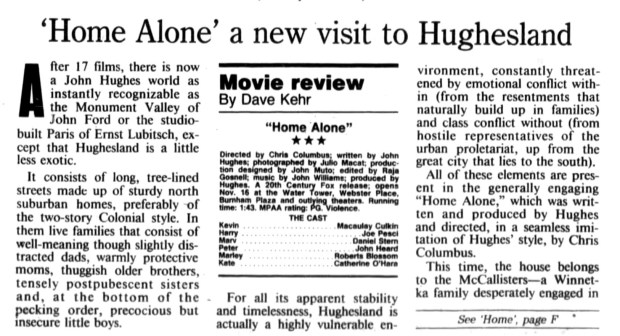Editor’s note: “Home Alone” holds an unparalleled sense of nostalgia for some, but for others, it might not yet be considered “vintage” enough for this newsletter. So, we’re taking some liberties this week.
Hollywood loves to use the Chicago area as a backdrop for family-friendly, holiday films including “National Lampoon’s Christmas Vacation” (1989), “Christmas With the Kranks” (2004) and “Fred Claus” (2007). Few, however, if any scenes from these movies were actually filmed in the city or suburbs.
Then, there’s “Home Alone.”
The 1990 film starring Macaulay Culkin — who will be at Rosemont Theatre Friday for a screening of the movie — features a variety of real homes, storefronts, churches and parks. Self-described “hometown girl” Jacolyn Baker Bucksbaum, who was the location manager for “Home Alone,” knows that Chicagoans expect authenticity when they see their lovely city portrayed on the big screen.
She cites, for example, the not-so-factual route in 1989’s “When Harry Met Sally” that Meg Ryan and Billy Crystal’s characters took from the University of Chicago to New York City.
“Things get embellished on all movies,” she told the Tribune earlier this week. “It was a beautiful shot. Yes, pretty shot of, you know, the (John) Hancock building in the background, of them driving up Lake Shore Drive. Does it make sense? No. But is it beautiful? Yes.”
Bucksbaum merged matter with movie magic when she discovered “Home Alone’s” iconic co-star — the stately home at 671 Lincoln Ave. in Winnetka, which probably has a gaggle of people in front of it right now taking selfies.
We asked Bucksbaum — who also scouted Chicago sites for “Flatliners” (1990), “Dennis the Menace” (1993), “Natural Born Killers” (1994), “Primal Fear” (1996) and others before becoming an executive producer and philanthropist — to share her memories of the sites that play a starring role in “Home Alone.”
Chicago history headlines
- Dec. 5, 1853: Constable James Quinn became the first Chicago police officer killed in the line of duty, but he wasn’t honored until 2010.
- Dec. 5, 1901: Walter Elias Disney was born in a two-story house at the southwest corner of Tripp Avenue and Palmer Street in the Hermosa neighborhood.
- Dec. 5, 1933: Prohibition was repealed.
- Dec. 5, 2021: Former White Sox great Minnie Miñoso was voted into the Baseball Hall of Fame.
671 Lincoln Ave., Winnetka
The original house used in the “Home Alone” movies is located in the North Shore suburb of Winnetka, Nov. 8, 2021.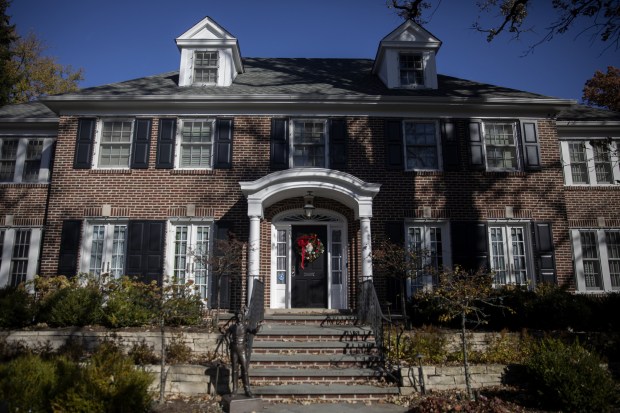
The residence may have been perfect for “Home Alone,” but Bucksbaum originally discovered it for “Uncle Buck” (1989), the first movie she worked on with John Hughes.
Bucksbaum’s introduction to the writer, director and producer was years in the making. After working on commercial sets with Wendy’s “Where’s the Beef?” ad director Joe Sedelmaier, she got her break in location scouting for the Michael Mann-produced TV series “Crime Story.” Her work in Chicago and Las Vegas for that show earned her an interview with Hughes at his Lake Forest home. Despite nerves, she and Hughes hit it off, connecting over music.
“I think once he trusted you, you became part of his, you know, inner circle,” she said. “And I think that’s why I was lucky enough to do all those films for him.”
She needed that confidence to convince Hughes, director Chris Columbus and production designer John Muto — who spent weeks looking in Oak Park and River Forest for their ideal neighborhood — that the Winnetka house would make the perfect home for the McCallister family.
“I have this other idea and it’s not what you guys have described to me, but I want to take you there because I think this has all the aspects that we need,” Bucksbaum said. “And so I brought them and the crew there and, of course, everyone fell in love with it right away because it really did work.”
Bucksbaum loved coordinating with the Abendshien family, who lived there at the time, and the rest of the block.
“I mean, it could have been the nicest location I’ve ever dealt with, thankfully, because we ended up bombarding that neighborhood completely,” she said. “The neighbors all got into it, and I got to know each of them because we had to get permission to use their lawns and set up Christmas decorations. So the whole neighborhood became our set.”
To Bucksbaum, the money shot of “Home Alone” is almost at the end of the film — when Culkin’s character, Kevin McCallister, wakes up to snow on Christmas Day.
In reality, she said, there was a standing order on set that a day’s shoot would be scrapped immediately and switched to that scene in case of a snowfall.
“Valentine’s Day night, we got this huge storm. We wore beepers back then, and I remember getting the beep, you know, ‘We’re moving to the McCallister house first thing in the morning,’” Bucksbaum said. “So I was running around to get that all arranged. We also had to make sure that no one walked on the lawns and no one messed up the set and, like, the whole street was our set.”
As for those scenes that show the inside of the home? Those were filmed at the old New Trier West High School in Northfield.
“I found New Trier West because they were closed, so I made the deal with New Trier to have all production offices there,” she said. “We used their gym as our soundstage, and built the interior of the house there. We used their pool for that water scene in the basement when the basement gets flooded. So it couldn’t have been any better.”
O’Hare International Airport
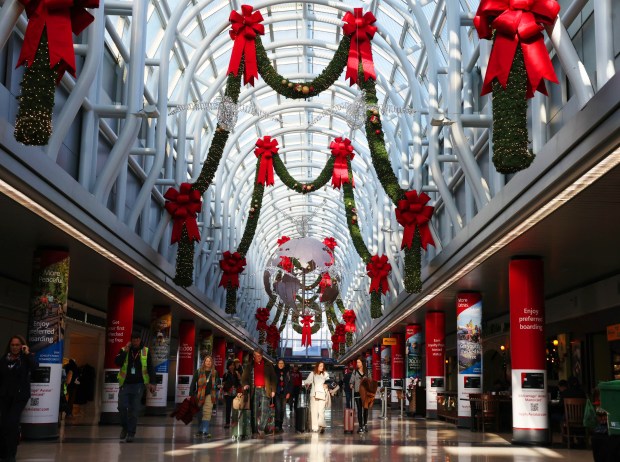
As Chuck Berry belted out, “Run Rudolph Run,” the 14-odd members of the McCallister family bolted through the airport’s Terminal 3.
“There’s no way you could do that today. No way,” Bucksbaum said.”You have to remember there was no security back then. No TSA. I mean, we even got on the tarmac without a lot of rigamarole. The terminal was not closed when we shot that — it was still operating as usual. We added extras and American Airlines even gave us a gate and we paid them to have a plane there.”
Bucksbaum said O’Hare airport is one of two locations she thinks she never would be able to secure for a movie shoot today. The other — a penitentiary.
“On the film ‘Natural Born Killers’ we shot at Stateville (Correctional Center) — a maximum security prison with real inmates — for three weeks,” she said.
Meigs Field (now Northerly Island Visitor Center)
Chicago’s Meigs Field is seen on April 5, 2003.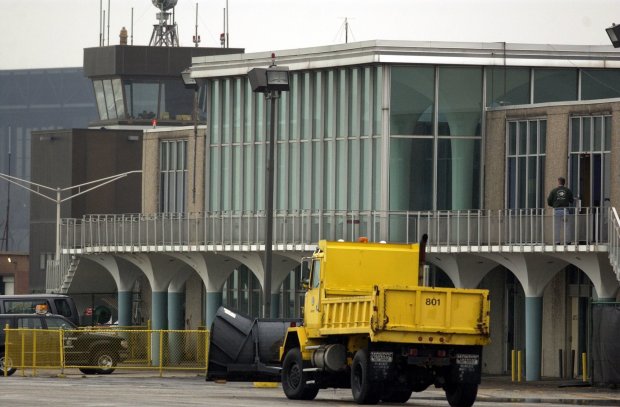
This stand-in site for an airport in Scranton, Pennsylvania, was familiar to Bucksbaum — she used it in “Crime Story” for its 1960s-period architecture.
“It was an empty building and we could create whatever we wanted inside it. We could control our extras and decorate it the way we wanted,” she said. “One of the reasons we went back to it is because it was quiet — it wasn’t a busy place.”
And since John Candy was available on set for only 24 hours, it was the perfect spot for Gus Polinski to meet Kate McCallister — and improv their lines.
“I would say the scenes with John Candy and Catherine O’Hara you know, those two together, they’re just magic,” Bucksbaum said.
Hubbard Woods
Stop for ice cream at Graeter’s, 940 Green Bay Road, Winnetka, and retrace Kevin McCallister’s steps in “Home Alone” through Hubbard Woods Park across the street.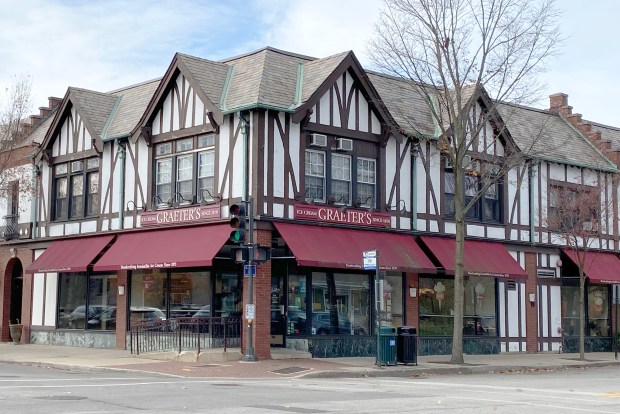
Hubbard Woods Park starred in a pivotal chase scene in the 1990 film “Home Alone.”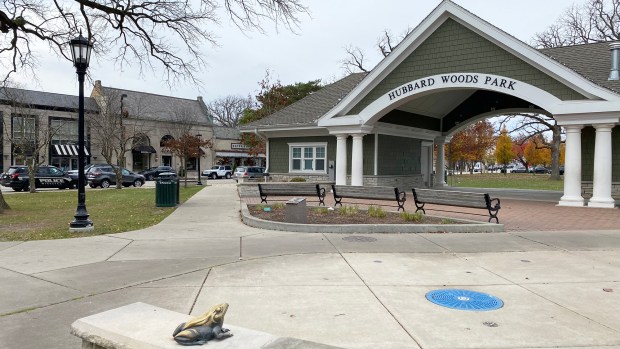
The Hubbard Woods station, 1065 Gage St., Winnetka, is located on Metra’s Union Pacific North line.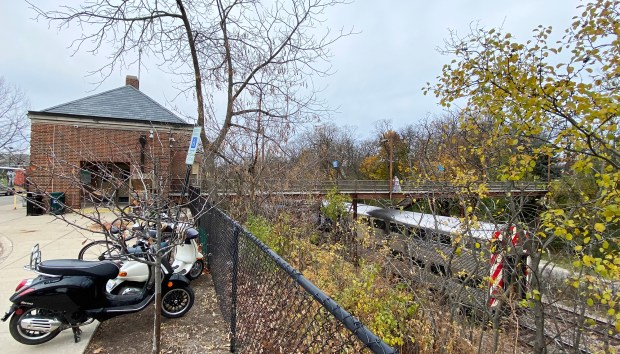
Creating the chase scene — even if it’s based around a child stealing a toothbrush from a drugstore — took the perfect combination of four locations. And, permission from the village.
“Winnetka had never done anything on this scale before. ‘She’s Having a Baby’ was shot in a church there, but they had never done as many days as we did,” Bucksbaum said.
The storefront, the park and the bridge over the Metra tracks are located next to each other off Green Bay Road. Though the interior of the store was actually a different space in Kenilworth.
Remember the cop who falls down while trying to catch Kevin? Bucksbaum says he was a Teamster who worked on the set. The pizza delivery guy? He was a crew member’s son.
“John (Hughes) loved to find someone with the right look and give them a part in his movies,” she said.
The church(es)
Though the church at 1024 Lake Ave., Wilmette, was used for outdoor scenes in the 1990 film “Home Alone,” another in Oak Park is where Kevin McCallister (Macaulay Culkin) meets his neighbor “Old Man” Marley (Roberts Blossom).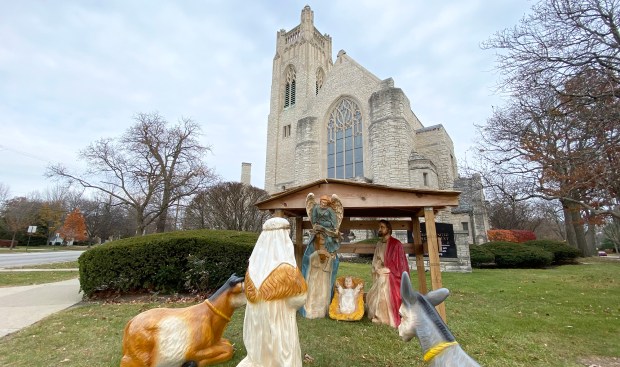
There were actually two churches used in “Home Alone” — one in Wilmette for the exterior and another in Oak Park for the interior. It’s a clever method meant to suspend disbelief and realize the director’s vision, Bucksbaum said.
The Rookery Building
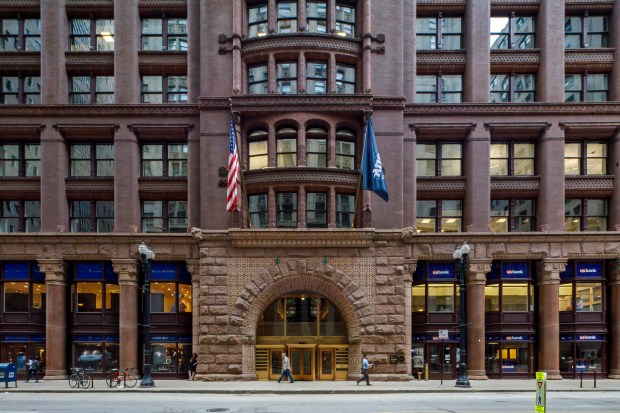
Bucksbaum, an assistant director on the sequel “Home Alone 2: Lost in New York,” estimates about 80% of it was filmed in Chicago.
Her favorite site of the follow-up? Duncan’s Toy Chest. Thanks to the addition of a big sign, Chicago’s Rookery Building stood in for the exterior shots of the store. Its interior was built inside another unlikely spot — the old Uptown Theatre.
Want more vintage Chicago?
- Become a Tribune subscriber: It’s just $12 for a 1-year digital subscription
- Follow us on Instagram: @vintagetribune
Thanks for reading!
Join our Chicagoland history Facebook group and follow us on Instagram for more from Chicago’s past.
Have an idea for Vintage Chicago Tribune? Share it with Kori Rumore and Marianne Mather at krumore@chicagotribune.com and mmather@chicagotribune.com


